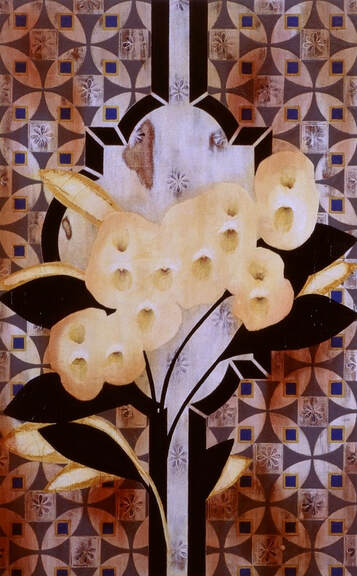Selected Reviews
Andrew Young at Alpha Gallery
New Art Examiner, May 1997
- Martin Mugar
|
Much that has been written about Andrew Young’s paintings is about the relationship between nature and the culture in his art. These eight medium-sized works in egg tempera reiterate that theme. In all of the paintings, flowers are symbols representing either pure nature, or nature encapsulated in culture. In Language Will Follow, flowers become schematized embossed patterns upon a heavily worked representation of Italianate ceramic; in Believe You Me, they emerge as impastoed white lilies. While in the rest of the paintings flowers often lose their specificity and float randomly like disembodied protoplasm over the geometric patterns of painted backgrounds, in these two works they cluster in the center of the canvas, framed by the flat black leaves linked to the black geometric patterns of the ceramic ground. It is ambiguous whether the flowers are growing from the ground or strewn as some kind of assault from nature on a geometric floor; as schematic patterns, the fluid white lilies are clearly nature denatured by the geometric patterns of culture, but the transitional role of the black leaves connects them to the cultural realm as well. Moreover, Young’s use of crackling compound in some of the grounds intensifies this ambiguity, introducing decay into the cultural arena. Is civilization, affected by entropy, reverting back to nature?
|
Believe You, Me, 1996
Egg tempera on wood panel, 44 x 28 in. |
|
Though Young is not interested in energized gesture, his work is not totally devoid of it, indicating that his view of culture is not purely ideational. He adopts, rather, an inclusive tactic where culture becomes nature and nature culture, both compressed in the tight space of the paintings. Ultimately, any representation of the organic can only be artifice: the white lilies become “natural” only in relation to the stylized geometric ground. Perhaps the cracking of the painted backgrounds becomes the only living mark in the work, a chemically induced gesture with an expressive content derivative of entropy, ultimately a more convincing manifestation of nature than the obvious one of flowers as organic growth.
|
